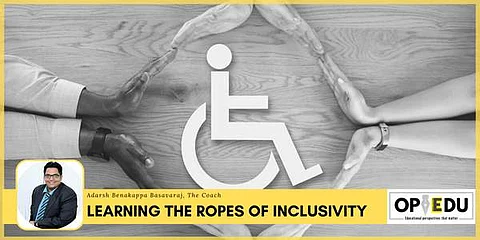

Inclusivity can only be achieved when we walk together. Well, kudos to IIT Bombay, as they have taken an amazing step to set up a cell for Persons with Disabilities (PwD Cell) on their campus. This initiative aims to create a support system, address grievances, spread awareness and even conduct orientation programmes that shall foster an inclusive environment and improve the experience of all individuals.
But for those of us who don't have access to the PwD Cell to get information, here's my simple ABC formula that shall enable all of us to bring about a culture of inclusion, with a little effort that shall make a huge difference to these individuals.
A - Acknowledge
The one BIG mistake that I've seen people make is to become very cautious, nervous or suddenly go into a shell around people with special needs. When I've asked them, "Why?", the first response that I've gotten in most cases is, "I'm afraid. What if I say something that might hurt their feelings?"
The first step that we can take is to accept their special needs and once that's out of the way... consider them as humans who have a different set of skills, abilities and capabilities. We need to be able to normalise the environment and make those with special needs become an organic part of any environment. Once we're able to do this, it opens up a channel of effective communication that removes the ambiguity which makes us nervous in the first place, as it enables individuals to seek assistance and also provide feedback without any hesitation.
B - Behave!
I've often seen people tease people with special needs behind their back, but have a very pretentious angelic behaviour in their presence. If the experience of me being badly body shamed throughout my life pushed me to the brim of insanity and the deepest level of depression... just imagine what these individuals might be going through.
Hence the most important behavioural trait that we need to develop is empathy. We need to, for a minute, do our level best to walk in their shoes and realise how challenging it might be to cope and then understand how we can make it easier for them. One very important thing to remember, empathise, not sympathise.
C - Converse and communicate
Instigate, involve and include them in all forms of communication. Be it written, verbal or digital. Ensure that they have an equal say and create a platform which enables the same. Also, make it a point to ensure that you maintain eye contact.
The best way I can end this conversation would be to appeal to everyone to create a culture of being able to connect with every individual by focusing on respect-ability!
With Regards,
Adarsh Benakappa Basavaraj
"Your Coach"
